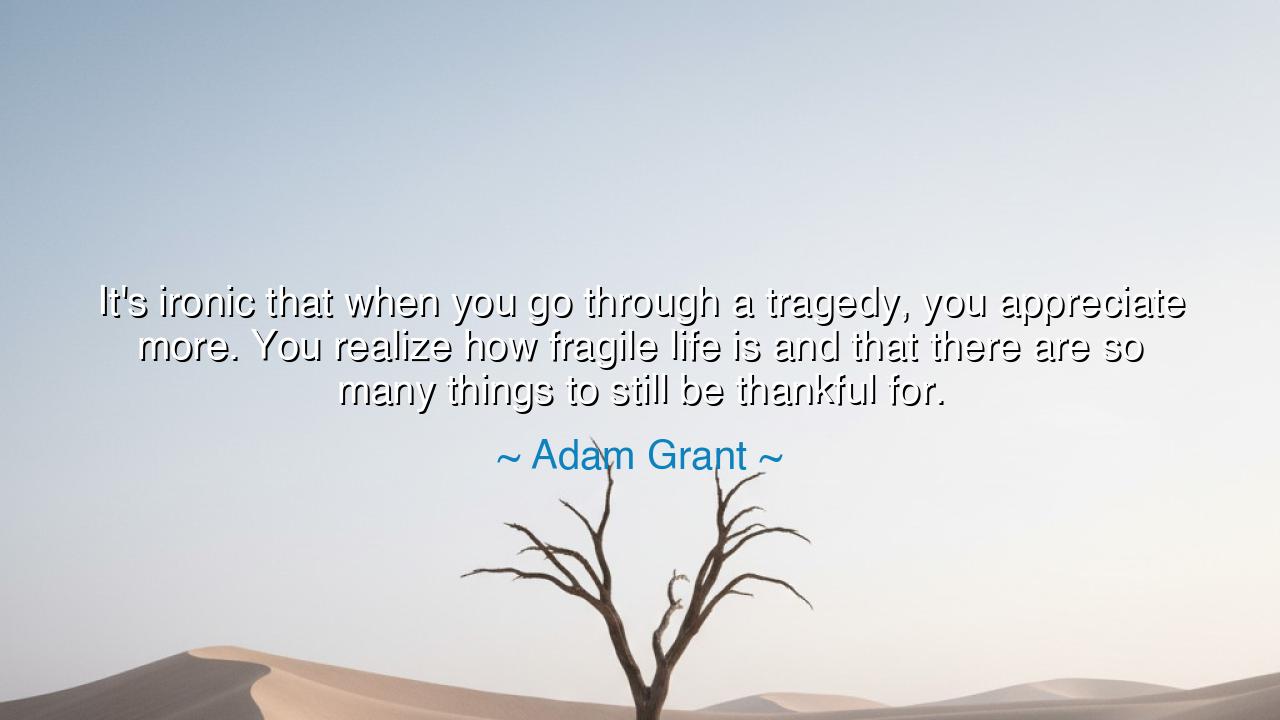
It's ironic that when you go through a tragedy, you appreciate
It's ironic that when you go through a tragedy, you appreciate more. You realize how fragile life is and that there are so many things to still be thankful for.






Hear now the words of Adam Grant, a voice of wisdom in our time: “It’s ironic that when you go through a tragedy, you appreciate more. You realize how fragile life is and that there are so many things to still be thankful for.” In this reflection lies the paradox of existence: that suffering, which seems to strip us of joy, can open our eyes to its abundance. In the ashes of sorrow, one discovers the hidden jewels of life. For only when we confront loss do we grasp how precious the ordinary truly is.
The ancients knew this truth well. The Stoics taught that memento mori—remember you must die—was not a curse, but a key to wisdom. By contemplating fragility, the heart learns to cherish what it has before it is gone. Adam Grant’s words flow from this lineage: that tragedy is not only a destroyer but also a teacher. It tears away illusions of permanence and awakens within us a fierce gratitude for each breath, each smile, each fleeting dawn.
Consider the tale of Pericles of Athens, who in the midst of the Peloponnesian War lost his beloved sons to plague. Though stricken with grief, he spoke to his people of endurance, urging them to honor life even in the face of devastation. His tragedy made him see, with deeper clarity, the preciousness of the city and the fragile gift of time. So too, when modern souls pass through sorrow, they awaken to the same truth—that the fragile cannot be taken for granted, but must be embraced while it endures.
Grant calls it ironic, and indeed it is. For one would think tragedy only darkens, only robs. Yet within its pain lies a mirror that reflects what is most essential. A person who has suffered does not scorn the small blessings: the warmth of the sun, the laughter of children, the embrace of a friend. They know that life is no fortress of stone, but a delicate flame trembling in the wind. And because of this knowledge, their gratitude burns brighter than before.
There is a certain heroism in this transformation. To suffer and become bitter is common; to suffer and become thankful is greatness. Heroes are not those who never fall, but those who, having fallen, rise with deeper vision. The warrior wounded in battle values peace more than the untested youth. The widow who has buried her beloved holds dear the companionship of family and friends. The survivor of storm or fire sees every calm day as miracle. This is the wisdom of the broken made whole again.
The origin of this truth lies in the nature of the human heart. We are blind to abundance until it is threatened. The river is ignored until the drought arrives; the friend is taken for granted until death claims them. Tragedy becomes the teacher we did not choose but cannot deny. It whispers, “Life is fragile—hold it tenderly. Love is fleeting—cherish it fiercely. Gratitude is the only fitting response to a world that can vanish in a breath.”
The lesson is plain: do not wait for tragedy to open your eyes. Practice gratitude now. See the fragile beauty of your days before sorrow reminds you of their worth. When loss comes, as it surely will, let it deepen rather than harden your heart. Be thankful for what remains, and honor what has been lost by living more fully in the present.
Practical wisdom calls to you: each day, pause and count the blessings that tragedy would one day reveal. Name aloud the people you love, the gifts you hold, the breath within your lungs. Live as if each moment were fragile glass, easily shattered, and handle it with reverence. In this way, when the storms of life come, you will already walk in the wisdom Adam Grant speaks of—eyes open, heart awakened, and spirit overflowing with thankfulness.






AAdministratorAdministrator
Welcome, honored guests. Please leave a comment, we will respond soon